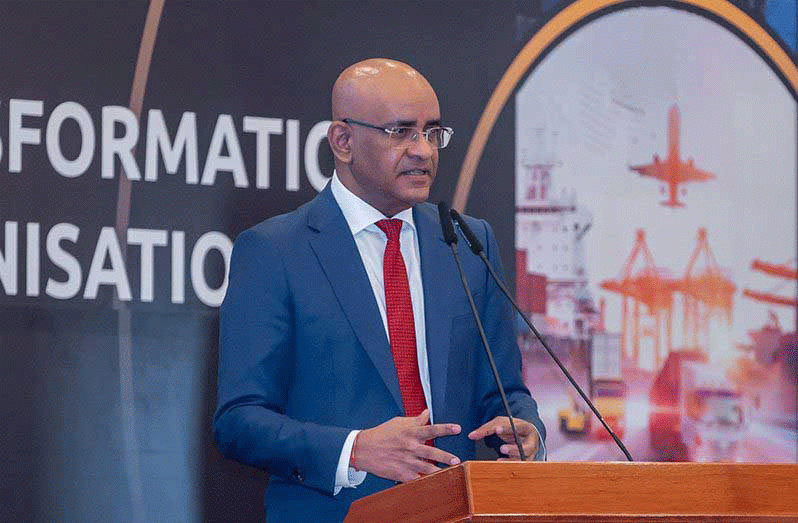-VP Jagdeo highlights country’s transformation
In light of the bright future that Guyanese are facing, Vice President, Dr Bharrat Jagdeo has given an in-depth analysis of how every single cent of the oil revenue is meeting the people.
During a recent press conference at Freedom House, Jagdeo, who is also the General Secretary of the governing People’s Progressive Party Civic (PPP/C), clarified some public statements and spoke about Guyana’s five years of oil.
While addressing the ongoing campaigns aimed at distorting the government’s achievements, the Vice President challenged the claims made in a recent Stabroek News editorial. The editorial attempted to blame the current government for the transgressions of the previous coalition administration. Jagdeo rejected these claims, defending the government’s record and emphasizing that it should not be held accountable for actions taken under the former administration.
While some oil-producing nations are grappling with corruption and a lack of investments in their traditional sectors, the Vice President explained that this state of infamy is not Guyana’s case. Responding to the criticisms of how the oil revenues are being spent, Jagdeo said there is not a “single bit of evidence” that any cent of oil money is missing.
The Vice President firmly stated that all funds under the current administration are fully accounted for, with robust safeguards in place to ensure accountability and transparency. He contrasted this with the situation under the previous A Partnership for National Unity + Alliance For Change (APNU+AFC) administration. Jagdeo highlighted the US$18 million signing bonus received by the APNU+AFC from ExxonMobil as an example. This bonus was not made public until the government faced intense criticism for its lack of transparency.
Jagdeo emphasised that such situations could not occur under the current government, pointing out that the Natural Resource Fund (NRF) Act prohibits illegal activities and ensures that all transactions are above board.
Underscoring that the NRF Act ensures that receipts of “every cent” are made public, Jagdeo said, “We have a clear provision, where all the money transferred to the budget can be traced and every cent in the budget has to be before it’s spent, has to be appropriated, and under the Auditor General control.”
He then boasted that Guyana has been getting high marks for this since there are oil-producing countries around the world that do not have the draconian provisions.
Staying on the topic of how oil revenues are being utilised, the Vice President said that the funds are not being squandered but instead, the money is going towards the citizens.
“You don’t see the money being spent on building a new building for the Office of the President like we’ve had or buying fleets of vehicles for the government even without oil money.”
The Vice President once again emphasised the contrast between the PPP/C and the APNU+AFC administrations in how they handle public funds. He pointed out that former President David Granger left office with a $35.2 million Lexus motor vehicle, highlighting the disparity in the treatment of former leaders. This was in stark contrast to the approach taken by the APNU+AFC administration when it attempted to provide former President Donald Ramotar with a Toyota Raum, a far less luxurious vehicle.
Jagdeo stressed that, unlike the previous administration, the current government is directing funds towards vital sectors such as education, healthcare, and infrastructure, benefiting the wider population rather than individuals.
“You see it [money] going massive in investments in infrastructure, roads for our people, not roads for the politicians, etc. Power plants. That’s where you see the money being spent.”
To ensure economic diversification and reduce reliance solely on the oil sector, the Vice President highlighted that the government has been making substantial investments in transforming traditional sectors. These investments aim to strengthen various areas of the economy, ensuring sustainable growth and development across multiple industries, rather than depending entirely on oil revenues.
“I don’t want to list the details, you will hear about this next week when the minister speaks about [the] tissue culture labs opening up new sectors, bringing in better quality animals, giving greater incentives, co-investing in the agricultural sector and other sectors to expand the economic base of the country,” the Vice President noted as he firmly underscored that the government has demonstrated where the money is going.
APNU+AFC’s Choices
The Vice President also addressed the ongoing discussions surrounding the Production Sharing Agreement (PSA) that was signed by the former APNU+AFC administration. He emphasized the importance of examining the terms of the agreement and the impact it had on the country’s oil sector.
“They (APNU+AFC) signed the PSA. But we are to be blamed because we did not renegotiate the PSA. But there is a provision in the PSA which says that the other side must agree to the renegotiation…Exxon has already said they don’t.”
He then pointed out that while there are persons trying to lump the government in the same boat with APNU+AFC, there is no acknowledgement of the PPP/C’s steps to steer Guyana in the right direction.
“Many countries that have been producing oil and gas for 60 years, they don’t have a local content policy. We have one and 1000 Guyanese companies are already benefiting from over 700 million of business. They didn’t see that as positive. They didn’t see now that you have to go to auction.”
Further, Jagdeo said that there is not even any acknowledgement of the new PSA that the PPP/C put in place with new royalty rates nor the strong environmental permits that they issued with a carbon tax.
Cementing that his administration does not hopscotch on matters of national interest, he said, “We are not doing things for the short or the PR benefits. People have to think through this. It’s not for the show or the PR benefits… It’s practical, to think through it logically, that is one thing that we work on logic.
“As I said before, we’re not dealing with the optics. We’re dealing with substance.”
EXCITING PERIOD
In just a few years, Guyana has gone from producing no oil to positioning itself to achieve one million barrels per day (bpd) by the early 2030s, a feat that took decades for oil-producing giants like Brazil and Angola.
What does the Vice President say about Guyana’s oil journey?
“So, if you if you really want to talk about what has happened in the five years since first oil it’s been an exciting period for us. We have made significant changes to the regime under which we can monitor and regulate the oil and gas sector, new laws, regulations, etc.
“We have kept our commitment to a new PSA and effectively we have renegotiated the five contracts outside of this Stabroek contract because now the new PSA would be applicable to them. We have passed the local content law. All of these things have been done by this government and we have utilized every cent of oil money in the areas that will benefit our people. This is a success story. It’s not infamy.”
Continuing to respond to detractors of development, he later said: “…We have made great strides and unlike the infamous behaviour in many other parts of the world with oil and gas money, you didn’t find that here in Guyana can trace every cent you can see it going to things that are visible to the people of this country that will change their lives.”



.jpg)










